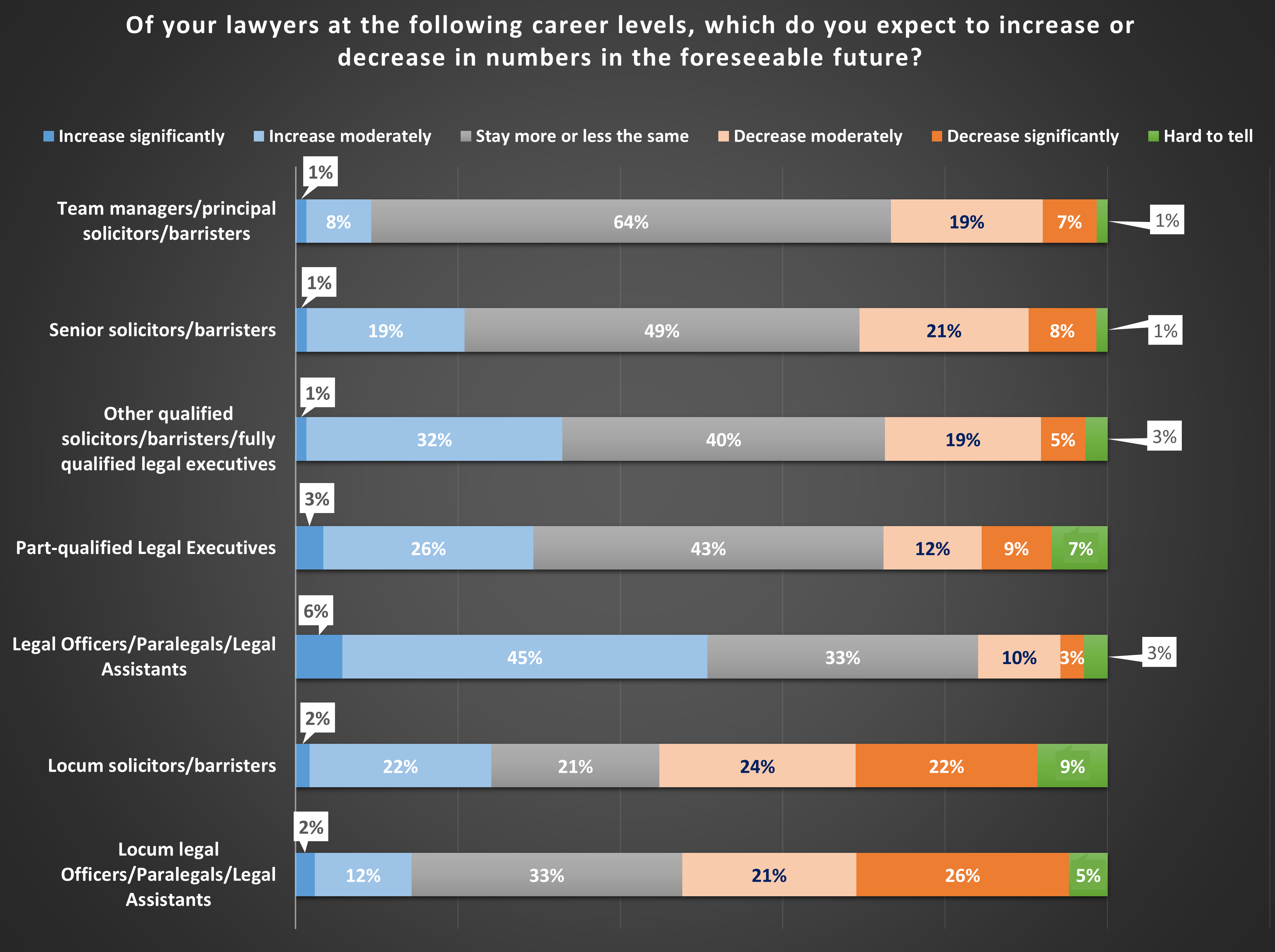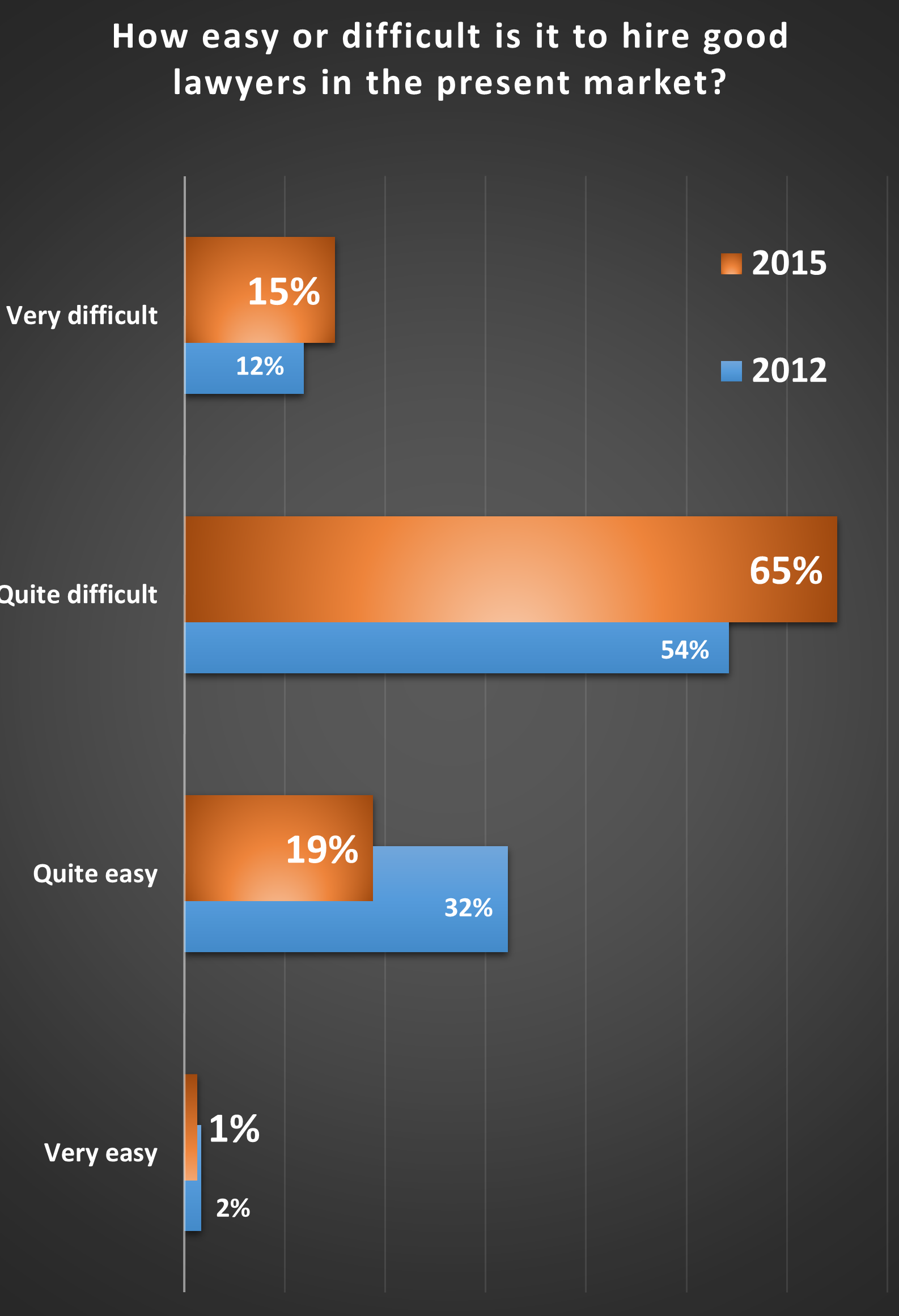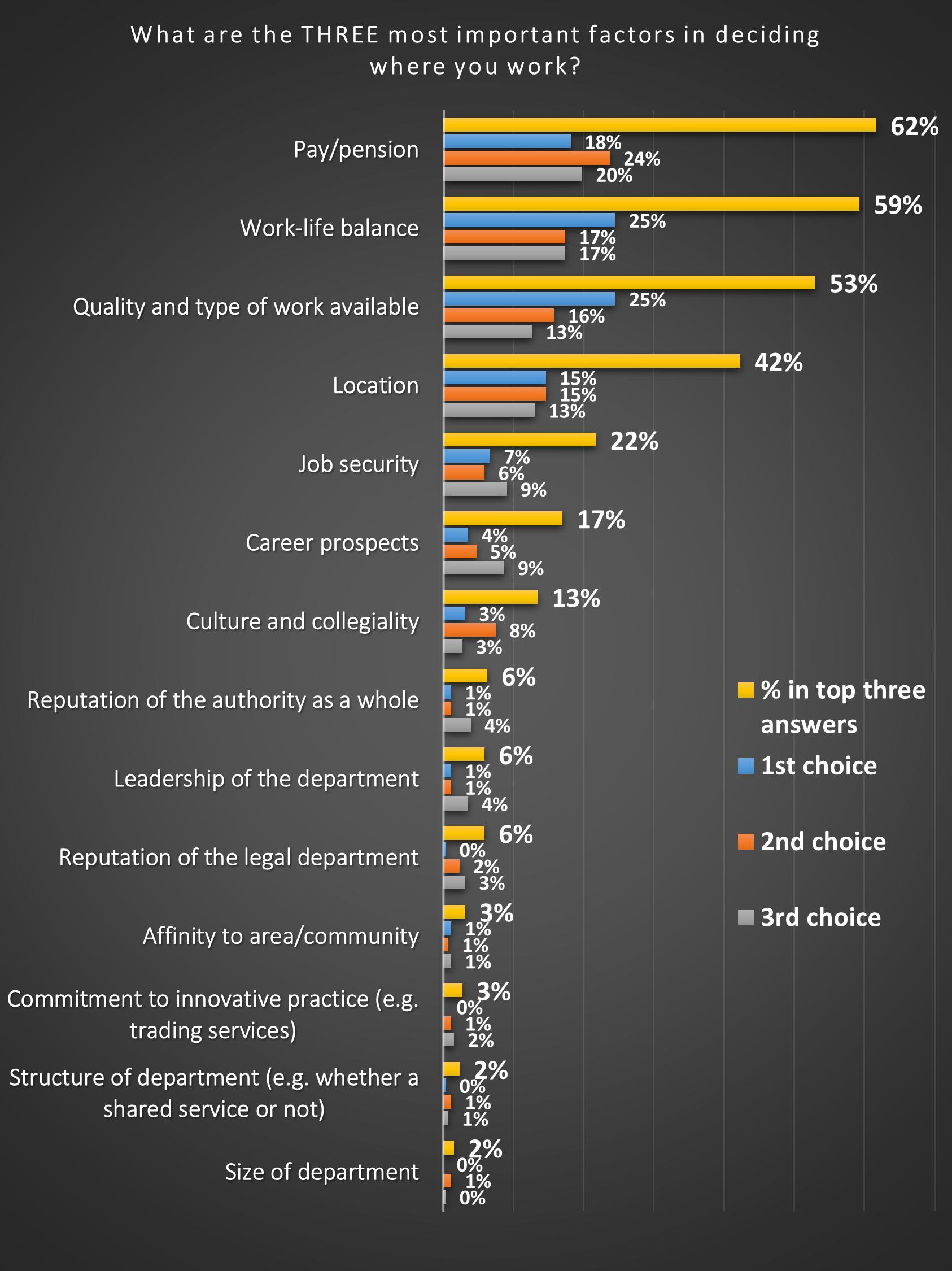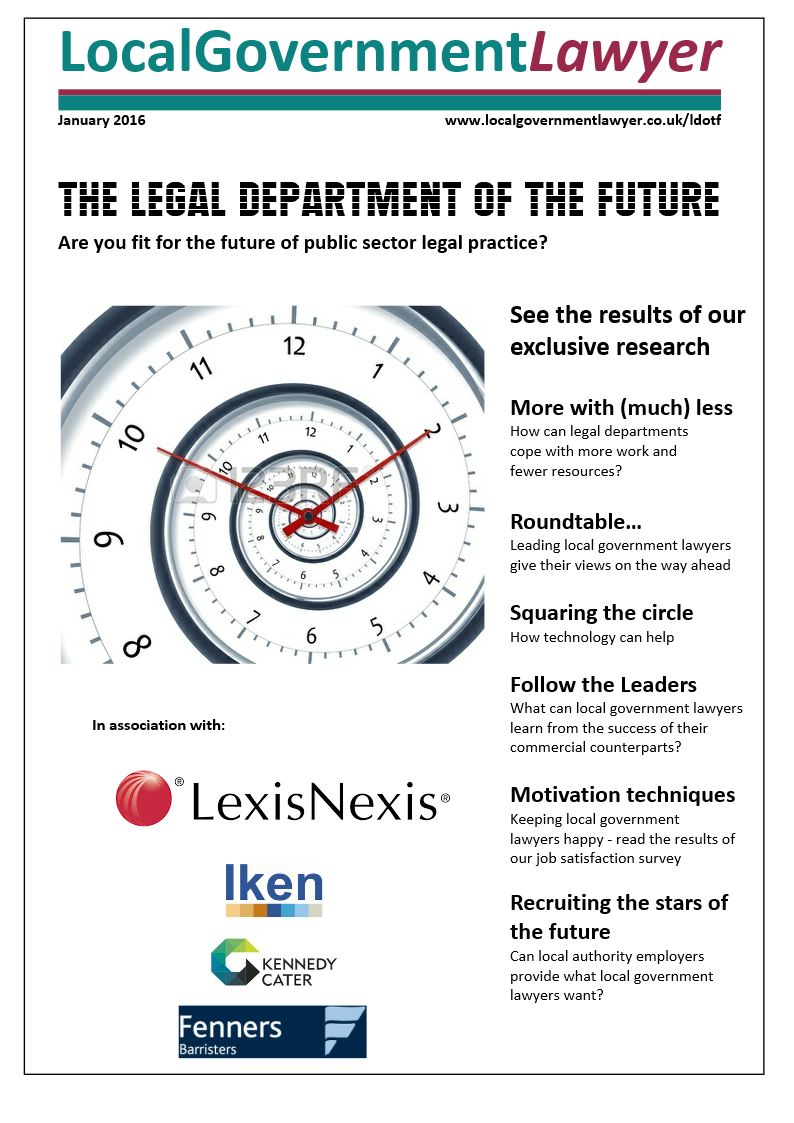- Details
The shape of things to come
Derek Bedlow looks at the implications of the Legal Department of the Future survey for how legal departments organise, recruit and retain their staff.
Doing more with less has become a cliché for local authority staff but for legal departments it is a stark reality as workloads rise and resources fall. One solution to this conundrum for many departments is to reshape their teams. While slightly more respondents to the management survey expect their departments to grow than to shrink (34% v 31%), the profile of departments in the foreseeable future is likely to become quite different as more senior roles are cut to make way for more junior lawyers, legal executives and paralegals.
So, for example, 51% of the 100 heads of legal that took part in the survey expect the number of paralegals and legal assistants to rise compared with just 13% who expect the number to fall. The numbers of legal executives and junior solicitors are also expected to rise, albeit less spectacularly, but more heads of legal say they will cut senior and principal solicitors than expect their numbers to rise (see chart below).
“We need to save money without reducing capacity and headcount too much as volumes are not decreasing,” says one head of legal.

Many local authority legal departments are behind the curve compared with private practice in implementing state-of the-art legal technology. Nevertheless, case management systems, workflow technology and enhanced research tools are beginning to facilitate the reengineering of departmental structures by enabling less experienced lawyers (and non-qualified staff) to handle matters that would previously have been the preserve of more experienced practitioners.
“Any increase in staff is likely to be at the non/part qualified level due to cost and a robust case management system facilitating lower-end process-driven work being dealt with at a lower qualification level,” one head of legal predicts.
As well as the cost, another reason for hiring non-qualified staff more is the difficulty that many departments currently face in recruiting more experienced lawyers, especially those with in-house local government experience.
 As workloads have risen, the survey of heads of legal shows that recruitment and retention is the third biggest challenge for departmental managers – it was eighth in 2012, the last time this survey was produced – and many expect the problem to become more acute. Four in five heads of legal say that they find it difficult to recruit good lawyers in the present market, while 15% describe it as “very” difficult. When the same question was asked in 2012, 66% said that recruitment was difficult (12% “very” difficult).
As workloads have risen, the survey of heads of legal shows that recruitment and retention is the third biggest challenge for departmental managers – it was eighth in 2012, the last time this survey was produced – and many expect the problem to become more acute. Four in five heads of legal say that they find it difficult to recruit good lawyers in the present market, while 15% describe it as “very” difficult. When the same question was asked in 2012, 66% said that recruitment was difficult (12% “very” difficult).
The most difficult disciplines to recruit into are planning (mentioned by 53% of respondents), procurement (50%), and property (29%), while, for those authorities that have responsibility for social care, adult social services lawyers and child protection lawyers are also in short supply.
Respondents to the management section of the survey put the reasons for this situation down to a number of factors, but pay freezes and the erosion of other benefits such as the Local Government Pension Scheme have left many local authorities looking unattractive compared with a recovering private practice in many areas of the country.
Heads of legal were also asked whether they expect recruitment to become easier or harder in future – not one expects it to get easier, while 40% think it will become harder still.
“Terms and conditions in local authorities stagnated during the recession and are now unappealing,” says one. “We need to do something to change this.”
Those that are recruiting for shared services teams have a harder task again, with 28% of respondents to the careers survey saying that they would be less likely to apply compared with just 7% who would be more likely.
However, departments that provide legal services to external clients are less of a turn-off for prospective recruits overall – while 25% of respondents say they would be less likely to apply to such a team, almost as many again – 19% – would be more likely to do so.
The expansion of trading could also help departments constrained by council-wide cuts by deriving additional income from sources beyond the host authority. However, one head of legal warns that this could also be double-edged sword from a financial point of view.
“I do think this business about paying rewards in the future is going to be more important,” he said. “I cannot see how I can task some of my team to deliver £1m income next year for me and accept that’s just part of the job.
“Pretty quickly they’re going to look at private practice and see that seems to be exactly the same job that they’re currently doing but it’s paying more money. I cannot see how you don’t have some modest reward for meeting your income targets. Why else they would do it?”
Getting the best: what do lawyers look for in an employer?
Respondents were asked to rank their top three most important factors in deciding where they work. Four stand out (in order): Pay/pension (included in the top three by 62% of respondents), work-life balance (59%), quality and type of work available (53%) and location (42%). Of these, work-life balance and quality/type of work are actually the most commonly given first choices at 25% each.
 Reflecting the general state of disillusion with promotion prospects amongst local authority lawyers (satisfaction with which was the lowest of all the working key criteria), career prospects are not a primary concern for the vast majority, being included in the top three by just 17% of respondents. A similarly realistic view of the ability of local authorities to provide job security seems to have been taken by respondents, a fifth of whom (22%) place this category in their top three considerations.
Reflecting the general state of disillusion with promotion prospects amongst local authority lawyers (satisfaction with which was the lowest of all the working key criteria), career prospects are not a primary concern for the vast majority, being included in the top three by just 17% of respondents. A similarly realistic view of the ability of local authorities to provide job security seems to have been taken by respondents, a fifth of whom (22%) place this category in their top three considerations.
Instead, when compared with the last careers survey in 2013, the importance of work-life balance has increased quite sharply (up 8%), while the importance of career enhancement has dropped by 5% in two years.
One consequence is that if more lawyers are content to stand still rather than move on to enhance their career prospects, it will lead to greater inertia in the recruitment market, making the hiring of experienced lawyers harder still.
Derek Bedlow is the publisher of Local Government Lawyer
 This article appeared in the Legal Department of the Future report, published in February 2016. To read or download the full report, please click on the following link: http://www.localgovernmentlawyer.co.uk/ldotf/
This article appeared in the Legal Department of the Future report, published in February 2016. To read or download the full report, please click on the following link: http://www.localgovernmentlawyer.co.uk/ldotf/
Solicitor - Contracts and Procurement
Head of Legal
Solicitor - Civil and Criminal Litigation
Child Care Lawyer
Litgation Solicitor
Commercial Lawyer
Legal Director - Government and Public Sector
Solicitor - Civil and Criminal Litigation
Locum roles
 Cornerstone Barristers roundtable on the Draft NPPF: Plan-Making Provisions
Cornerstone Barristers roundtable on the Draft NPPF: Plan-Making Provisions
09-02-2026 2:00 pm
London
 Breakfast Briefing – Commonhold & Leasehold Reform Bill – a session focusing on the key themes of the Bill and the Consultation on Banning Leasehold for New Flats - Devonshires
Breakfast Briefing – Commonhold & Leasehold Reform Bill – a session focusing on the key themes of the Bill and the Consultation on Banning Leasehold for New Flats - Devonshires
12-02-2026 8:30 am
London
 Planning, Property and Power Webinar Series: Strategic energy planning - Landmark Chambers
Planning, Property and Power Webinar Series: Strategic energy planning - Landmark Chambers
12-02-2026 10:00 am
Online (live)
 Public Sector Insights – NHS Continuing Healthcare (CHC) in Wales - Blake Morgan
Public Sector Insights – NHS Continuing Healthcare (CHC) in Wales - Blake Morgan
12-02-2026 10:00 am
Online (live)
 InLaws workshop – Effective Communicating and Influencing - Devonshires
InLaws workshop – Effective Communicating and Influencing - Devonshires
12-02-2026 2:00 pm
Online (live)
 HMPL Building Blocks: Legal Tools to Combat Anti-Social Behaviour - Devonshires
HMPL Building Blocks: Legal Tools to Combat Anti-Social Behaviour - Devonshires
17-02-2026
Online (live)
 Data Controller, Processor or Joint Controller: What am I? - Act Now
Data Controller, Processor or Joint Controller: What am I? - Act Now
18-02-2026 10:00 am
Online (live)
 Freedom of thought, belief and religion: Article 9 ECHR - Francis Taylor Building
Freedom of thought, belief and religion: Article 9 ECHR - Francis Taylor Building
19-02-2026
Online (live)
 AI and Information Governance: Bridging Innovation and Compliance - Act Now
AI and Information Governance: Bridging Innovation and Compliance - Act Now
19-02-2026 10:00 am
Online (live)
 Safeguarding Issues and Fairness in Investigations and Hearings - 3PB
Safeguarding Issues and Fairness in Investigations and Hearings - 3PB
24-02-2026 11:00 am
Online (live)
 Children and Young People (DoL, Competency and Capacity) - Peter Edwards Law Training
Children and Young People (DoL, Competency and Capacity) - Peter Edwards Law Training
25-02-2026
Online (live)
























































































































 The General Data Protection Regulation - Act Now
The General Data Protection Regulation - Act Now  Interveners in financial remedy proceedings - 42BR
Interveners in financial remedy proceedings - 42BR  The Procurement Act - One Year On - DWF
The Procurement Act - One Year On - DWF  The ERA – An Overview - Sharpe Pritchard
The ERA – An Overview - Sharpe Pritchard  Short Term Lets - Ivy Legal
Short Term Lets - Ivy Legal 